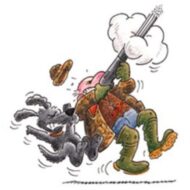This story was published in the October 2009 issue of Wildfowl magazine.
Let’s put one vicious rumor to rest right now: Canada geese do not produce one pound of solid waste per day. Some goose hunters might, after a bowl of bad chili or a tainted pizza, but Canada geese? No way.
It may seem like they do if your kid plays soccer or baseball on a field where several dozen geese have been grazing, but according to Dr. Bruce Manny, research fishery biologist with the U.S. Geological Survey, the average Canada goose produces 0.3432 lbs. (5.49 oz.) of wet droppings per day, which is equivalent to 0.0722 lbs. (1.15 oz.) of dry droppings. I find this hard to believe, since I’ve scraped that much off my shoes after nine holes of golf.
Now, to me, the key word in this scenario is average. To get an average figure, someone has to weigh the “production” of more than one goose. In fact the more geese used in the study the more valid your average becomes. Therefore someone has what is probably a full-time job weighing goose poop. {I know, I know. it’s a nasty job but somebody has to do it.}
No matter where you work you know that the new guy gets the worst assignments, then works his way up toward the plums that come with seniority. I’m sure Dr. Manny himself doesn’t crawl around on his hands and knees with a little scale picking up blobs of goose poop and weighing them {although he may have when he first went to work for the U.S. Geological Survey}. This assignment probably goes to an intern, maybe a biologist wannabe, or the kid who was hired last week, just out of college. When this unfortunate person gets home from work after a hard day in the field, you can imagine what his answer will be when his wife asks, “How were things at work today, Dear?’
The more you think about it, the more questions arise. Do they put diapers on individual geese, then take them off at the end of the day and weigh the contents? Or is each employee assigned a specific goose to monitor, walking around behind it with a pad and pencil and a measuring cup? What happens if your goose decides to fly away? Are you just **** out of luck? And what is a goose poop day anyway, twelve hours or twenty-four? How do you measure your goose’s production when it goes to roost on water at night? Is proficiency at scuba diving, or at least snorkeling, a prerequisite for the job? What about the poor soul who has to crawl around on his hands and knees trying to decide whether the droppings are wet or dry? There’s only one way to tell. Right?
According to someone named Choo Choo Love {I’m not making this up, as Dave Barry would say} who is evidently an authority on the subject, “theirs smells better than ours”. On what empirical evidence does she base this statement? Personal experience? Talk about your cruddy jobs….
If we think Canada geese make a mess on our golf courses, our parks, and ball fields, we should hope snow and blue geese never take up the habits of their darker cousins. Can you imagine zillions of snows and blues waddling around on your favorite golf course, each one depositing its individual 5.4 oz. wet {1.5 oz. dry} allotment of waste per day? You think sand traps and water hazards are problems…
However they arrive at their alleged “average”, I’m just glad someone other than yours truly has this important job. The next time I’m lying on my back in a layout blind watching these majestic birds circle my decoys, I’ll try to remember that they don’t each produce a pound of waste per day. And I’ll hope that, as they reject my decoys and fly away high overhead, they don’t punctuate their disapproval of my spread and my lousy calling by depositing any of it, either wet or dry, on my face.
I don’t know about you, but I’m pooped out just thinking about it.

